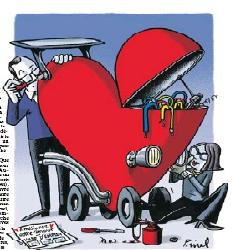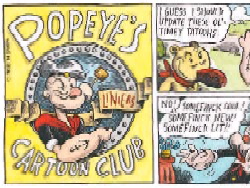February 2019 Culture and Society
Read the articles selected in February 2019
Ludwig Boltzmann und das Ende der alten Physik
By Tanja Traxler
Source: Der Standard, 20 February
175 years ago was born Ludwig Boltzmann, the eclectic physicist who not only contributed to breaking the walls between scientific and philosophical thought, but with his works on the entropy and the introduction of the statistical method in the physics opened the doors to the quantic mechanic.
Wahrheiten des Menschseins
By Bernhard Schultz
Source: Der Tagesspiegel, 18 February
“All the Rembrandts” presented by the Rijksmuseum in Amsterdam intend to show the best ever attributed to Rembrandt: the different techniques that he uses create the field of possibilities to express the human drama, and how in this is mirrored the artist’s humanity.
Cédric Villani
By Nicolas Ungemuth
Source: Le Figaro Magazine, 15 February
Immersion by Cédric Villani argues the usefulness of science in the politics, in a world where the decisions are getting more and more complex and technological, while the IA development doesn’t leave free alternatives without the risk of a third-party dominance.
Herzlos ist die Welt
By Wenke Husmann
Source: Die Zeit, 19 February

L’esclusione dalla Berlinale di Berlin I love you , girato da Ai Weiwei come contribuito al film a episodi Cities-of-Love ha scatenato una serie di polemiche di ordine politico, probabilmente riducibili a ragioni prettamente artistiche. Intanto Berlin I love you è stato già accolto negli USA.
Consulta l’articolo:
https://www.zeit.de/kultur/film/2019-02/berlin-i-love-you-ai-weiwei-berlinale-zensur-china
Aimer autrement, un nouvel enjeu?
By Pascale Senk
Source: Le Figaro, 11 February

If in the past it was the literature the great book of the sentimental formation, today love is object of psychotherapies and meditation, as if it were about a skill to be developed, in the tendency to forget the capacity to listen to ourselves and the hormones that rule us.
Sex war gestern
By Mia Eidlhuber, Karin Pollack & Bernardette Redl
Source: Der Standard, 9 February
In Why love ends the sociologist Eva Illouz describes the changing love and sex in the consumer and technologic capitalism, where the availability of alternatives and a such sex-friendly climate have charged with anxiety the investment in a sentimental relation and complicated the sexual life.
Schlechte und gute Traditionen?
By Laurenz Lütteken
Source: die Faz, 10 February
This reflection on how the Weltanschauungen followed in the history have influenced or even determined the philologic methods, showing in the particular light of music that we must always question the text, removing from it every ideological layer.
Read more:
Leur surface est une frontière au-delà delaquelle la gravité est si puissante que plus rien ne peut s’échapper
By Victor García
Source: L’Express, 13 February
The scientific discovery of the year will be an image of black holes. The photography will give the evidence of their existence, supposed in Einstein’s theory of relativity, thanks to 8 telescopes scattered on the whole globe, and the most massive amount of data collected in the history of science.
Ethisces Versagen in der Forschung?
By David Rennert
Source: Der Standard, 7 February
It is known that China uses the organs of jailed people for transplantation with research purpose. But also the international journals that host the resulting studies lack transparency as for the methods of trials and the origin of the organs, showing a disquieting and absurd ethical resignation by the scientific community.
Italy and France in spat over anniversary
By Angelique Chrisafis & Angela Giuffrida
Source: The Guardian, 2 February
Four Leonardo’s paintings, as object of exchange between Italy and the Louvre, have become the center of a political-diplomatic dispute with France. Barbara Agosti, our professor of art history , warns the risk of a stalemate in the intercultural exchanges, which is apparently not congruent with the universal value of art.
Défis éthiques en pagaille
By Victor Garcia
Source: L’Express, 30 January
Although the philosophical issues raised from the IA concern the human irreducibility and the transhumanism’s ideology, Le Mythe de la Singularité by Jean Gabriel Ganascia invites to not to overlook the economic and political interests at stake. So the new Vase of Pandora is the black box of the technology.
Ne m’appelez plus jamais intelligence artificielle
By Jean-Marc Vittori
Source: Les Echos, 5 February
Technology is made not only of devices, but also of the vocabulary created to indicate them. Names put often real headaches. At bottom, what is artificial intelligence made of? A computer and Internet.
The biggest question
By Ian Sample
Source: The Guardian, 26 January

The laws of nature, as described by biology, are insufficient to explain how life came to be. The intersection of biology and physics of information can show patterns in the living beings to explain that they are not brought about by accident, but by fundamental principles that rule the universe.
Popeye the sailor gets a makeover for his 90th birthday
By Michael Cavna
Source: The Washington Post, 30 January

Popeye isn’t yet sick of eating spinach, boxing and of his girl-friend Olivia. Some new series of cartoons revive this hero still loved by children for the absurd and natural way he moves and his muscles grow , and for his sense for the adventure.
La recherche permet de fermer la porte au négationnisme en révélant l’entreprise de dissimulation du génocide
By Virginie Bloch-Lainé
Source: Libération, 28 January
An international work team of the CNRS has faced the uneasy question of genocides and negationisms. A report to be published by the commission highlights the progress of research in this field, starting from the Shoha, and the complacency of partisan interests in the dissimulation of mass crimes.
L’intelligence artificielle dope la traduction en ligne
By Lucie Ronfaut
Source: Le Figaro, 29 January
Digital translations don’t grope more around the meaning of the words in a complex text. New systems based on networks of artificial neurons allow to catch the context of one phrase, while digital assistants deliver simultaneous translation of oral chats.
Info
- Pubblicato il : 25/02/2019 Modificato il : 04/04/2019
Allegati
- Wahrheiten des Menschseins pdf
- Ludwig Boltzmann pdf
- Cédric Villani pdf
- Leur surface est une frontière pdf
- Sex war gestern pdf
- Aimer autrement pdf
- Ne m'appelez plus jamais intelligence artificielle! pdf
- Défis éthiques en pagaille pdf
- Italy and France in spat over anniversary pdf
- Ethisches Versagen pdf
- L'intelligence artificielle dope la traduction en ligne pdf
- Fermer la porte au négationnisme pdf
- Popeye the sailor pdf
- The biggest question pdf

